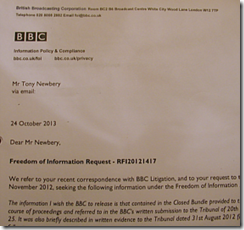 In the Mail on Sunday today, David Rose has reported on some startling developments in the long, long quest for information about a BBC’s 2006 seminar on climate change. He has been very careful, as ever, to get his facts right, but writing for a popular Sunday paper necessarily means that much detail has had to be sacrificed in favour of a broad brush and the big picture. This is not a criticism in any way, it is just that a lot more could be said if space and the genre permitted.
In the Mail on Sunday today, David Rose has reported on some startling developments in the long, long quest for information about a BBC’s 2006 seminar on climate change. He has been very careful, as ever, to get his facts right, but writing for a popular Sunday paper necessarily means that much detail has had to be sacrificed in favour of a broad brush and the big picture. This is not a criticism in any way, it is just that a lot more could be said if space and the genre permitted.
What is clear in the Mail on Sunday report is that funding for the 2006 BBC climate change seminar came from a government department. Also that the funds were channelled through environmental lobbyists who were organising the seminar. And it is possible that the government department that provided the funds had some input about the topics selected for the seminars.
The documents concerning the International Broadcasting Trust’s (IBT) application to the Department for International Development (DFID) were obtained by Terry Sanders who kindly sent them to me. He deserves a very big thank-you indeed!
The Mail on Sunday article does not mention the 2005 G8 summit, which Tony Blair chaired. The subjects that he chose to lead on were development in Africa and climate change. Those happen to be the very subjects that the seminars focused on at that time. It is also interesting that when Sir David King was reminiscing at the time of his retirement as Chief Scientific Adviser to the UK Government he not only laid claim to turning Tony Blair on to climate change, but he also seems to imply that he was instrumental in getting the subject on the G8 agenda.
What is certain is that the Government organised the 2005 Avoiding Dangerous Climate Change conference at the Hadley Centre, which led to a barrage of scare stories in the media, and that this was done in order to raise public awareness of the problem. A major seminar at the BBC early the following year, which was organised by environmental lobbyists who were being funded by a government department, must have seemed like a godsend to the Downing Street spin-doctors.
Lord Hall, as the man who encouraged Roger Harrabin to set up the seminar programme, features in this story too. He had left the BBC to run the Royal Opera House before DFID got involved with the seminars, so he bears no direct responsibility for what happened in 2005 and 2006. However since his return to the BBC he has thrown some interesting light on the matter, contradicting just about everything that the BBC has claimed about the seminar previously.
Here are some of the things that the BBC has said about the seminar:
It was described in John Bridcut’s landmark ‘Wagon Wheel’ report on BBC’s impartiality, which was adopted and published by the BBC Trust in July 2007, as:
”A high level seminar with some of the best scientific experts [on climate change]”
The BBC’s letter of 31st August 2007 refusing to disclose the information I had requested says:
”… information relating to the seminar is held to help inform the BBC’s editorial policy around reporting climate change.
…
The attendees at the seminar were made up of 30 key BBC staff and 30 invited guests who are specialists in the area of climate change.”
A BBC submission to my previous Information Tribunal appeal last year had the following description:
“The requested information concerns the organisation, administration and content of a seminar concerning editorial challenges to the reporting of climate change. The seminar was held in order to provide attendees with an understanding of the existing state of knowledge on the issue of climate change, to identify where the main areas of debate lie,to provoke the imagination of the media to deal with the scope of the issue and to consider the role of the BBC in the public debate.”
Lord Hall of Birkenhead, BBC Director General, in written supplementary evidence to the House of Commons Culture Media and Sport Select Committee 25/06/2013:
“ The title of the seminar was ‘Climate Change, the Challenge to Broadcasting ‘ … the guests were not ‘a panel of climate change experts’, nor were they ‘advising the BBC on what their approach to climate change should be. Seminars such as this do not set BBC editorial policy on how it covers climate change’”.
You just could not have a more explicit conflict of evidence, and surely it really is necessary now to dig down to the truth, however uncomfortable that might be.
With so much at stake where trust in the BBC is concerned, it would seem essential that, as the statutory regulatory body, the BBC Trust should now set up a genuinely independent inquiry into how editorial policy on climate change has been formulated and who has been able to exert influence on that process. If you think that this is the right next step, then you might like to write to the House of Commons Culture Media and Sport Select Committee (cmscom@parliament.uk). If enough people do so, then they just might put some pressure on Lord Patten to act next time he is hauled up in front of them. He has been on the receiving end of some pretty rough handling by that committee recently.
There is still a great deal more to come out about this matter, and I think that the best thing that I can do at the moment is attempt to answer any questions that people might have.
The Disclosed Documents
Documents that Terry Sanders obtained from DFID concerning IBT funding. These include a very recent additional disclosure which names some senior BBC executives and shows that Mark Thompson, then Director General of the BBC, was directly involved in negotiations over the seminar programme with the IBT.
1 IBT application for DFID funding.pdf
2 Correspondence.pdf
3 Grant Agreement.pdf
4 Grant Approval.pdf
5 Financials.pdf
6 Addional disclosure BBC names.pdf
The documents that I have obtained from the BBC, including lists of attendees, their brief biogs, Jana Bennett’s opening remarks, and a briefing document and some administrative documents.
1 BBC diclosures.pdf
2 BBC disclosures.pdf
Some of the files are quite large and may take some time to download.
Anyone seeking more context on this post may like to read Andrew Montford’s excellent The Propaganda Bureau or Christopher Booker’s equally excellent The BBC And Climate Change: A Triple Betrayal. Both deal with the earlier revelations about the BBC climate change seminar and its consequences.


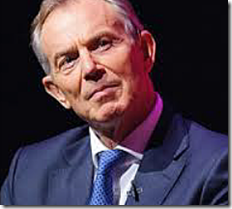

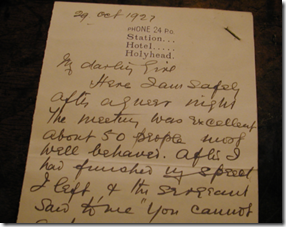

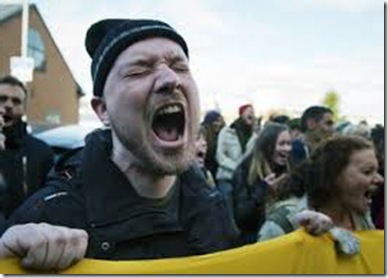

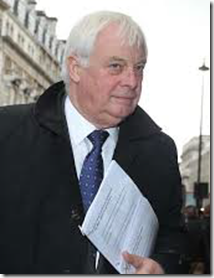
Recent Comments